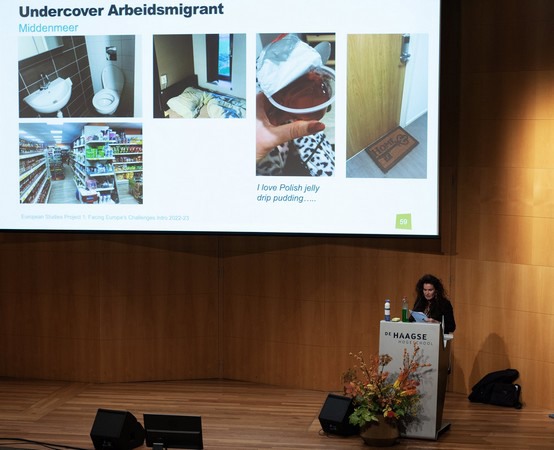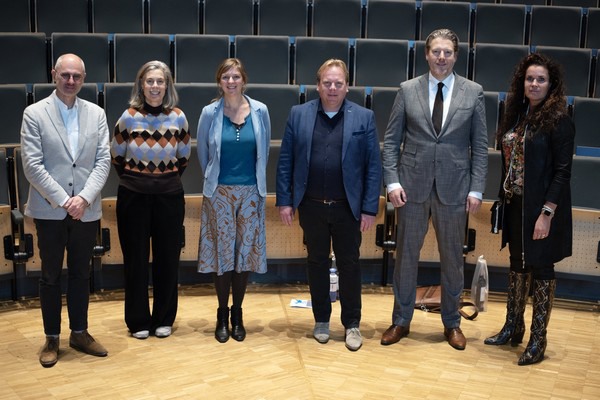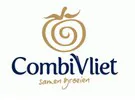On Friday, 2 December, CombiVliet was invited to give a presentation on how they, as a company, deal, experience, and live with international employees. The other speakers, Thomas Zwiers, Martin Grisel, and Caspar Sluiter, also told their stories at the request of Rosa Groen, Research Lecturer at The Hague University of Applied Sciences and this year voted Sustainable Higher Education Lecturer of the Year 2022.

On behalf of CombiVliet, Martine van der Meer, responsible for HRM and Communication at the large tomato grower, told the story below. She faced a room of first-year higher education students working on a project centered around this topical subject.
"It was a nice experience," says Martine. "Because it was quite a fun, hands-on, informative presentation, I would like to share it with you."

Below in full is her presentation, after Martine first briefly spoke a bit about her background: employed at CombiVliet for eight years, living in Maasdijk, daughter of a tomato grower, and besides being a mother, wife, and employee, also a human being. "I've been doing this all for about 25 years. A strange combination? I think HRM is 80% communication. Communication is one of the most difficult subjects there is. Everyone does it, but many problems in the world arise from miscommunication, divorces, wars, quarrels, etc."
"I have done several higher education courses. My base is Marketing and Communication. Furthermore, I have studied HRM, labor law, and psychology & coaching."
The company Combivliet
CombiVliet is a family business. Its founder, Petrus Cornelis van Vliet, started the horticultural company in the mid-1950s. At the age of 20, his son Theo took over.
The company became big in growing cherry tomatoes. At that time, smaller tomatoes were something new! There were only large round tomatoes and beef tomatoes on the market. It grew into a company with branches in Westland, Rilland, and Middenmeer. And later also in France and Brazil.
The management also expanded with, besides general manager Theo van Vliet, operations manager Edwin de la Combé, financial manager Eric van Heijningen and (son) Roy van Vliet as location manager NoordVliet.
Since 1 July this year, Roy took over the baton from his father and became general manager. Theo is still involved in the company but no longer every day.
CombiVliet is strong in collaboration. Various collaborations have been established over the years in the areas of breeding, energy, labor, purchasing, automation, packaging, logistics, sales, and marketing.
Working with international employees
About 20 years ago, more and more workers from eastern Europe came to work temporarily in the Netherlands. Poland, for example, joined the EU 18 years ago, making it possible to come and work in the Netherlands. For this, all kinds of arrangements had to be made by CombiVliet and others. These people not only wanted to work but also needed housing, transport, and all kinds of other facilities for the time they stayed in the Netherlands.
Since the basis of CombiVliet is growing tomatoes, we set up a separate company for this too. At first, this was simply run from our office, but when it started to grow, because this was a collaboration between a number of growing companies, it moved to a separate location. This company is called NL Jobs. NL Jobs is our own employment agency. They arrange everything they need for these people. And this is a job in itself because a tomato company cannot just do this on the side. In the high season, NL Jobs employs as many as 2,500-3,000 people. It is quite a task to arrange accommodation for them, for instance. People come and go, and they all need a place to live.
Nationalities
In the parts of the Netherlands where the cultivation companies have greenhouses, NL Jobs has an office and several accommodation centers where people live for as long as they come to work in the Netherlands. During the winter period, these people mostly return home and then come back to work with us in spring. The tomato season runs from April to November. Some people come back every year, some come for several years, but there are also people who only come during the summer months to get to know the Netherlands and then go back home. In the past, these were mostly Polish people, but in the meantime, there are many other nationalities from Hungary, Bulgaria, Ukraine, Romania, etc. We have as many as seven nationalities at the moment.
Duration of work
People who stay in the Netherlands for a longer period of time, year-round, are also employed in other sectors to ensure year-round work. NL Jobs also provides this for them. Often, they save to pay off their house in their home country, which is their pension, when they stop working in the Netherlands.
Basically, most people come to the Netherlands to earn money. Therefore, in our experience, they are not waiting for all kinds of provisions that will make their net salary lower and lower. They want to save for their future!
If flexible labor can be converted into permanent labor and workers themselves see this as an added value, this should be possible if there is year-round work. Looking at horticulture, this is difficult for production work because it cannot be done year-round.
Seasonal work
Crop work is available for about 10-11 months, and harvest work for about eight months a year. Tomato plants are replaced after 10-11 months, and then it takes another 2-3 months for the first tomatoes to appear. With grow lights, year-round cultivation became an option to spread labor over the year. However, due to high energy prices, many crops will no longer be provided with grow light. This means the need for flexible labor is increasing. Is that a bad thing? It makes it more difficult and more challenging in a tight labor market. It harks back to the horticulture of the last century when there was no grow light.
It is important for us as a company that seasonal work is well thought through by the government. That seasonal work is not year-round and that these people who come here from abroad to work for a season(s) often do not want a permanent contract. They want to earn a lot of money in a short time to build a life in their home country. They do not want all kinds of schemes like PAWW, pension, unemployment, etc., that increase costs. This is a disadvantage for workers coming here for shorter periods.
Year-round functions
As CombiVliet, we also employ quite a few people in the company as permanent employees. These are the positions that need to be filled year-round. These people do need permanence and certain arrangements. These are mostly managerial positions or positions in the Technical Department, logistics, or biology department. Almost all of them have bought a house in the Netherlands, integrated well, speak the Dutch language, have mostly had children in the Netherlands, and intend to stay here in the Netherlands. About 35-40 % of our workforce now has another nationality.
As a company, we are used to working with different nationalities. Because it is quite difficult to put yourself in the shoes of people who work here in the Netherlands and have their family and friends in another country, two years ago I spent two nights in two of our accommodation centers; in Middenmeer Noord Holland and in Hoek van Holland.
My experiences as an undercover migrant worker
I regularly hear those horror stories about migrant workers in the media, which makes me think; where is this happening? Who is doing that? What on earth is going on there!?!!!
It would be nice if the employer, the employment agency, the incident, and the specific circumstances were known so that controlling and responsible authorities could intervene immediately. Stop this company or situation... Often it is only half a story. However, you usually never hear about what the final outcome is after an investigation. Strange! It appears that practices like this can still continue unseen, without any consequences.
I sit on the Platform International Employees of GlasTuinbouwNederland. To get a more complete picture, I decided to do my homework. Because I don't just want to defend the employer's interests because that's what I'm paid to do. I want to sit there as a human being, standing up for people who need it, regardless of where someone comes from. But I also want to be treated fairly as a company or industry. If we do something wrong, we have to change it. If someone else does something wrong, we don't want to be blamed for it as an industry or company. Surely this is not too much to ask?
So I have now slept in a hotel, or accommodation center as we usually call it, of migrant workers twice. In Agriport, a fairly new accommodation center, and in Hoek van Holland, an older accommodation. With my pillow, duvet, and mattress cover, I left for my room after work. Just a standard room, in Agriport next to the bike shed and in Hoek van Holland overlooking the Stenaline car park instead of the Waterweg.
The location in Middenmeer is brand new. Everything is new. It is located near the horticultural area. The hotel has its own supermarket, which is convenient. It's several kilometers from the city center. That's a bit less convenient, I found. Also, you had a kitchen in your room/apartment. So you mostly stay in your own space because you have everything at your disposal there. In Hoek van Holland, a Stenaline hotel from the past for the ship's crew, the rooms were smaller. I had cooking facilities in a central kitchen. This was all a bit less luxurious, but next to the center of Hoek van Holland, next to the metro, and close to the beach, forest, and the Waterweg, so much more entertainment. If I could choose, despite the smaller and more luxurious room, I would still choose Hoek van Holland. This is also a popular location with people from NL Jobs.
As it was only one night, I understand that this is not entirely realistic, of course. Still, I noticed, heard, experienced, and saw things that I would not have witnessed from behind my desk. In any case, what I experienced is that you can also clean your teeth with a scouring pad and washing-up liquid just fine if you forgot your toothbrush...
Different cultures, different habits
What is it like when you go to work in another country? The Netherlands is a culture where people dare to say anything. We don't mince words. We just throw it out there. If we disagree with the government, we call it out. We think that's normal. But for people who are not from the Netherlands, that feels strange. Those are mostly used for a stronger hierarchy and more hierarchical respect.
Take our international employees at CombiVliet. They come to the Netherlands to work. They have to learn to function in our culture. A culture in which we say what we think while they don't say or do certain things out of respect. Perhaps that is quite smart in certain situations.
Communication
Thinking and acting differently can also lead to misunderstandings. We went on courses for that too. So did they, for that matter. We learned how to deal with each other, which prevents misunderstandings.
For instance, Polish people find it very strange that at funerals, we show all kinds of photos of smiling people on a projector in memory and then play an Andre Hazes song. Why don't we have dramatic music and black clothes on? Whereas if we have a birthday and it is supposed to be a party, we sit in a circle looking at each other. Why don't we dance and make it a party?
What can you learn from another and vice versa?
That's an interesting topic. Look at others differently. The very diversity of people makes the whole more beautiful and special. What can you learn from others, and what can others learn from you? It would be nice if there was an interaction in this.
As a family ourselves, we have a student in the house. On the weekends, she is at home in Drachten, and during the week, she lives with us in Maasdijk. She is at the conservatoire in Rotterdam. She is 17 years old. Now Drachten is in Friesland and not abroad, but even for her, it is a world of difference because of how different the people here in the West of the country are compared to up North. In a different environment, and your family just lives in a different part of the Netherlands. Can you imagine if you don't speak the language and you don't go home at weekends? By the way, when she speaks Frisian, I can't understand her either. That aside, it's fun to discover the differences and similarities and do something for each other.
What do we value as employers!
I realize that as CombiVliet, as an employer, we have to realize that we are all human beings living life in these times. We all want to be valued and to feel safe. That is important. If we as a company can offer that to these people, they will love working with us, and this is a great foundation for the future. It's up to us to make this happen! The tight labor market means they can work anywhere, but how do we make sure they still choose us.....
For more information:
Martine van der Meer 
CombiVliet
[email protected]
www.combivliet.nl
